In the evolving landscape of web development, the choice of best laravel hosting can significantly influence the performance and functionality of applications, particularly those built with frameworks like Laravel. Laravel, known for its elegant syntax and robust features, demands a hosting solution that can keep pace with its capabilities. This article delves into the top 10 VPS servers that seamlessly integrate with Laravel, highlighting their features, advantages, and the criteria for selection. By making an informed choice, developers can optimize their applications and enhance user experiences.
Table of Contents
Criteria for Selection of Best Laravel Hosting
Choosing the right best laravel hosting requires a comprehensive understanding of various factors that impact performance, scalability, and overall user satisfaction. This section outlines the key criteria essential for selecting a VPS hosting service that complements Laravel development.
Performance
Performance is arguably the most critical factor to consider. A Virtual private Server (VPS) with high-performance capabilities ensures quick load times and smooth operation, especially during peak traffic. Key performance metrics include CPU speed, RAM availability, and disk I/O speed. A server that can efficiently manage requests will provide a seamless experience for users interacting with Laravel applications.
Scalability
Scalability allows your application to grow seamlessly as your user base expands. This means the best laravel hosting should offer easy upgrade paths, such as additional CPU cores, RAM, and storage, without significant downtime or complicated migration processes. For Laravel applications that may experience variable traffic patterns, scalability is essential to maintain performance.
Support
Quality customer support is invaluable, especially for developers who may encounter technical challenges. Opting for the best laravel hosting provider that offers robust support—preferably 24/7—can alleviate potential frustrations. Providers that offer specialized support for Laravel or PHP technologies can be particularly beneficial.
Pricing
While performance and support are vital, pricing also plays an important role. It is essential to balance cost with the features offered. Many VPS providers offer tiered pricing plans that cater to different needs, allowing developers to find a solution that fits their budget while still providing top-tier service.
VPS Server Options
Here, we explore ten best laravel hosting providers that stand out in the market, particularly for Laravel developers. Each has unique features and strengths, making them suitable for various needs.
DigitalOcean
DigitalOcean, widely recognized for its simplicity and a developer-friendly environment, stands out as one of the best Laravel hosting solutions available today; through its provision of SSD storage and a highly scalable architecture, it delivers exceptional performance tailored specifically for Laravel applications, making it an ideal choice for both general audiences and tech enthusiasts alike. Its intuitive control panel and comprehensive documentation are advantageous for new developers.
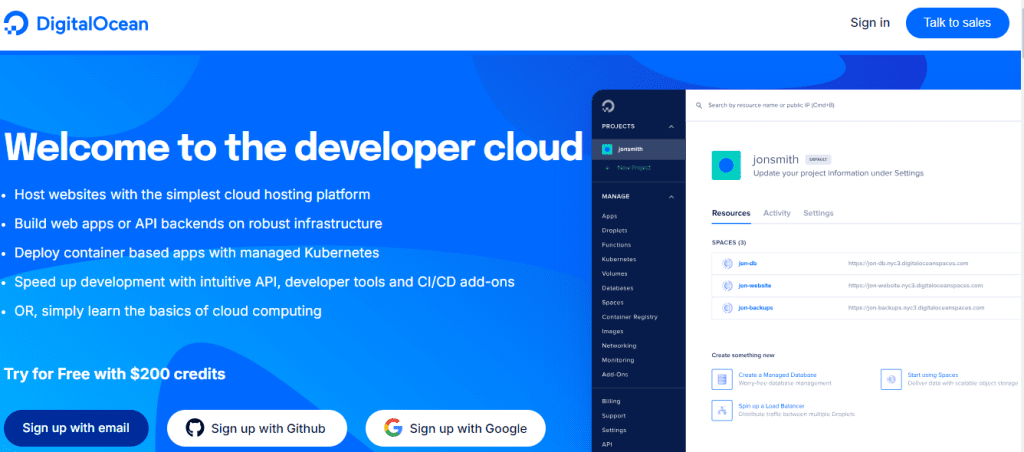
Why It’s Great for Laravel:
- Scalability: DigitalOcean allows you to easily scale your Laravel application as your traffic grows.
- Simplicity: The platform is straightforward, making it easy for developers to deploy and manage their applications.
- Community Support: DigitalOcean has a vast community and extensive documentation, making it easier to troubleshoot issues.
Cons:
- No Managed Hosting: Similar to Vultr, DigitalOcean requires you to manage your servers, which might be challenging for those without sysadmin experience.
Linode
Linode provides a powerful VPS solution with a robust infrastructure. It offers a variety of plans, allowing for custom configurations that suit Laravel’s requirements. The platform also provides extensive community support and a user-friendly API.

Why It’s Great for Laravel:
- Performance: Linode offers high-performance SSD servers, ensuring your Laravel application runs efficiently.
- Customizability: Like Vultr and DigitalOcean, Linode gives you control over your server setup, which is ideal for developers who need specific configurations.
- Support: Linode offers 24/7 support, which is crucial when running a live Laravel application.
Cons:
- No Managed Services: Linode is not managed hosting, so you’ll need to handle server management tasks.
Vultr
Vultr offers a wide range of VPS options at competitive prices. Its global data centers ensure low latency, essential for Laravel applications targeting international users. Additionally, its automated deployment processes can significantly reduce setup time.
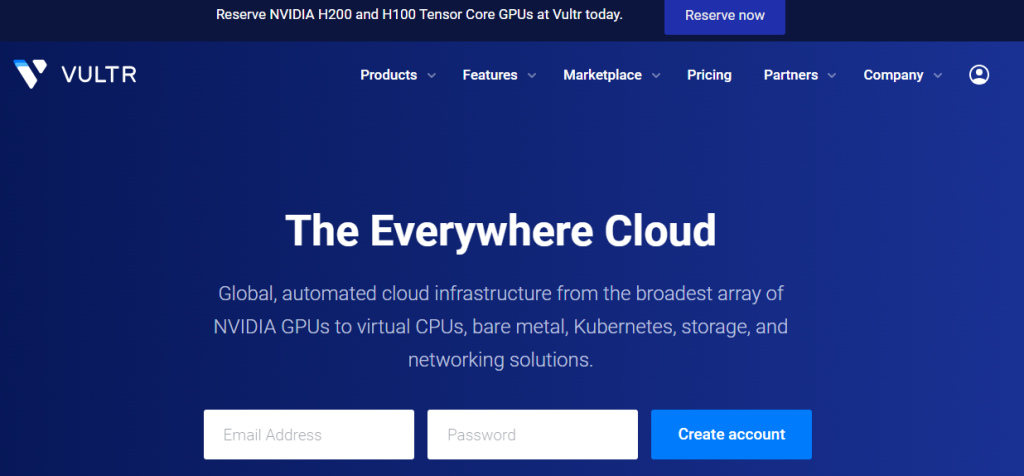
Why It’s Great for Laravel:
- Customizability: You can choose the resources and server configurations that best suit your Laravel application.
- Performance: Vultr provides SSD storage, fast networking, and the latest Intel CPUs, ensuring your application runs smoothly.
- Affordability: Vultr’s flexible pricing means you only pay for the resources you use, making it a cost-effective option.
Cons:
- No Managed Services: Unlike Cloudways, Vultr is not a managed hosting provider, meaning you need to handle server management tasks.
AWS Lightsail
AWS Lightsail is a simplified service from Amazon Web Services, designed to provide a user-friendly interface for deploying applications. It allows for easy integration with other AWS services, making it ideal for complex Laravel applications that may require additional cloud features.
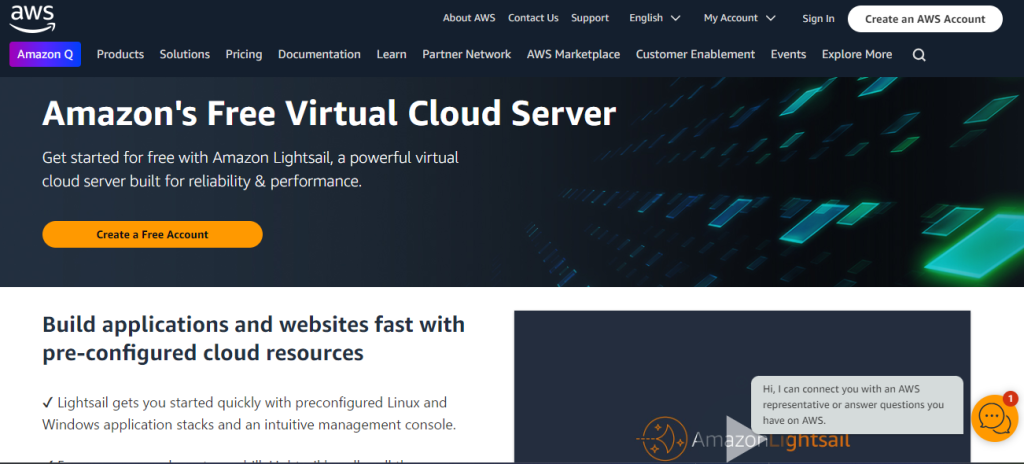
Why It’s Great for Laravel:
- Cost-effective: AWS Lightsail is great for Laravel because it offers a cost-effective, easy-to-use platform with pre-configured environments that simplify the deployment and management of Laravel applications.
- Scalability: It provides the reliability and scalability of AWS, allowing you to start small and grow as needed.
- Performance: With predictable pricing and global reach, Lightsail ensures that your Laravel app performs well, scales efficiently, and remains secure without the complexities of more advanced AWS services.
Google Cloud Platform
Google Cloud Platform offers a scalable and flexible VPS solution, with powerful machine types and configurations. Its robust security features and integration with other Google services make it an attractive option for Laravel developers looking for reliability and performance.

Pros of Google Cloud Platform (GCP):
High Performance: GCP offers powerful computing infrastructure and networking capabilities, delivering high performance and low latency for applications.
AI and Machine Learning Integration: GCP provides advanced AI and machine learning tools like TensorFlow and AutoML, making it ideal for projects that require sophisticated data analysis and AI capabilities.
Global Network: GCP leverages Google’s global network infrastructure, ensuring fast, reliable access to services across the world.
Cons of Google Cloud Platform (GCP):
Complex Pricing: GCP’s pricing structure can be complex and difficult to navigate, particularly with its usage-based model, making cost management challenging.
Steep Learning Curve: For new users, GCP’s extensive range of services and configurations can be overwhelming, requiring a significant time investment to master.
Limited Support for Microsoft Products: GCP may not integrate as seamlessly with Microsoft-based tools and applications, which could be a drawback for businesses reliant on the Microsoft ecosystem.
Azure
Microsoft Azure provides comprehensive cloud services, including VPS hosting. Its integration capabilities with various Microsoft tools and services can be a significant advantage for businesses already using the Microsoft ecosystem. Azure also offers scalability and performance optimization tools suited for Laravel applications.
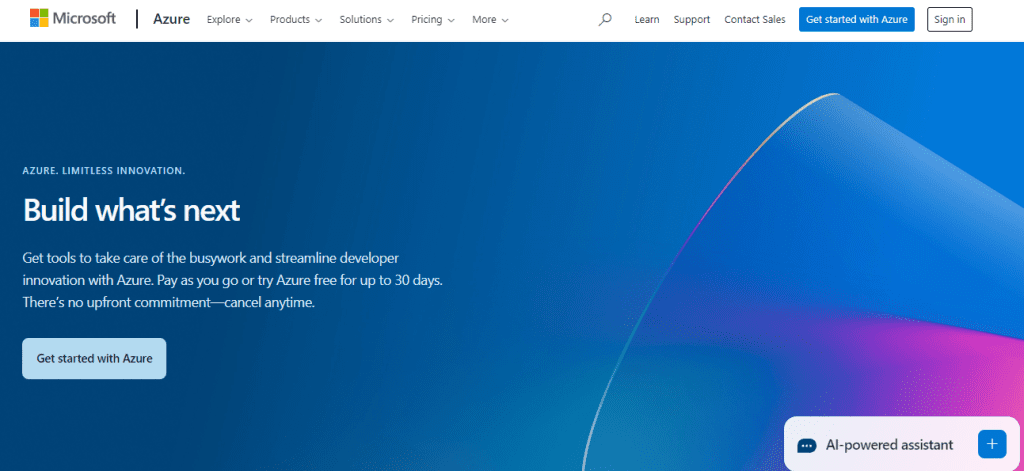
Pros of Microsoft Azure:
Scalability: Azure provides extensive scalability options, allowing businesses to easily scale resources up or down based on demand, making it ideal for both small startups and large enterprises.
Global Reach: With data centers in multiple regions worldwide, Azure enables low-latency and high-performance access to applications and services for users globally.
Integration with Microsoft Products: Azure integrates seamlessly with other Microsoft services like Office 365, Dynamics 365, and Windows Server, making it a strong choice for businesses already using Microsoft products.
Cons of Microsoft Azure:
Complex Pricing: Azure’s pricing model can be complex and challenging to understand, with various tiers, add-ons, and usage-based costs, making it difficult to predict expenses.
Steep Learning Curve: For those new to cloud computing, Azure can have a steep learning curve due to its vast array of services and configurations.
Support Costs: While Azure offers robust support, advanced support options can be costly, which might be a concern for smaller businesses or startups.
Bluehost
Bluehost is known for its WordPress hosting but also offers reliable VPS services. With excellent customer support and easy setup, it’s a good option for Laravel developers looking for a straightforward hosting solution at an affordable price point.

Why It’s Great for Laravel:
Beginner-Friendly: Bluehost offers an intuitive interface with one-click installations, making it easy for beginners to set up websites, including those running on WordPress or Laravel.
24/7 Support: Bluehost provides round-the-clock customer support via phone, chat, and email, ensuring help is available whenever you need it.
Affordable Pricing: Bluehost offers competitive pricing with various plans that include free domain registration for the first year, making it a budget-friendly option for hosting.
A2 Hosting
A2 Hosting focuses on performance with its Turbo Servers, which can significantly speed up Laravel applications. With a strong emphasis on customer support and extensive documentation, it’s an appealing choice for developers seeking both speed and assistance.

Why It’s Great for Laravel:
- Speed: A2 Hosting offers turbo servers that can load pages up to 20 times faster than regular hosting.
- Developer-Friendly: A2 Hosting supports various versions of PHP, MySQL, and provides SSH access, Git integration, and other developer tools.
- Laravel Pre-installed: You can choose to have Laravel pre-installed when you set up your hosting account.
Cons:
- Expensive Turbo Plans: The turbo servers, while fast, are more expensive compared to their standard plans.
InMotion Hosting
InMotion Hosting is recognized for its robust performance and customer service. They offer a variety of VPS hosting plans that allow for easy upgrades, making it suitable for developers who anticipate growth in their Laravel applications.
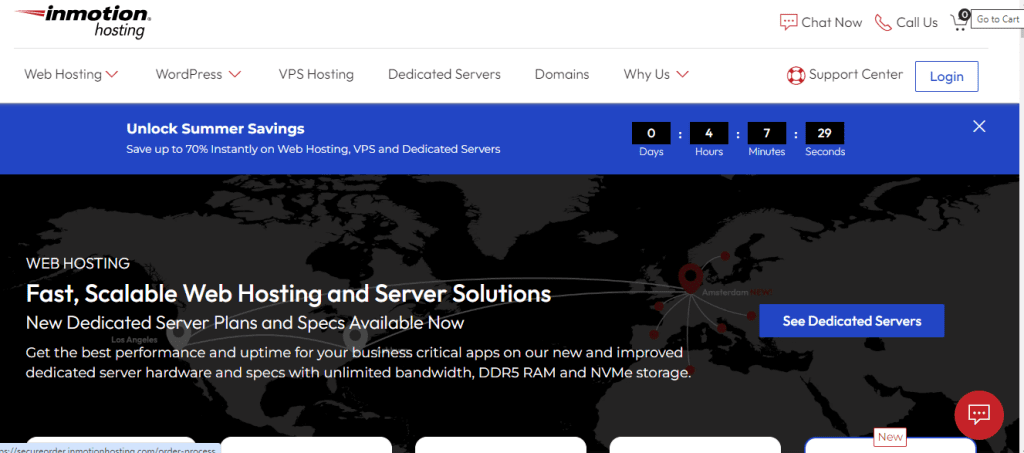
Why It’s Great for Laravel:
- Developer Tools: InMotion Hosting provides SSH access, free SSL, and supports various PHP versions, making it a great environment for Laravel.
- Security: Free security features like SSL, hack protection, and automatic backups ensure your Laravel application is safe.
- Support: InMotion Hosting has a reputation for excellent customer service, offering 24/7 support.
Cons:
- Pricing: InMotion Hosting is slightly more expensive than some competitors, especially when renewing.
HostGator
HostGator provides a user-friendly VPS hosting service, making it easy for developers to deploy Laravel applications quickly. With scalable options and a strong support team, it is a practical choice for those just starting.

Why It’s Great for Laravel:
- Affordability: Hostinger offers some of the lowest prices in the industry, making it an excellent choice for developers on a budget.
- Ease of Use: The control panel is user-friendly and designed to make the management of your Laravel application straightforward.
- Performance: Despite its low cost, Hostinger offers SSD storage and a 99.9% uptime guarantee.
Cons:
- Limited Resources on Lower Plans: The basic plans have limited resources, which might not be sufficient for larger applications.
Read Also : Promising Salary for Cyber Security Jobs in 2024 – Analyzing Trends and Influencing Factors
Comparison of best laravel hosting features
To better understand the differences among these best laravel hosting providers, we can compare key features that impact the deployment and performance of Laravel applications. The following sections cover performance metrics, user experience, and integration capabilities.
Performance Metrics
When comparing performance, factors such as CPU power, RAM options, and storage speed are paramount. DigitalOcean and Linode often lead in performance metrics, providing high-speed SSD storage and ample memory, which are crucial for running resource-intensive Laravel applications. Meanwhile, AWS Lightsail and Google Cloud Platform excel in offering flexibility and scalability, allowing developers to tailor resources according to their needs.
User Experience
User experience encompasses the ease of use of the control panel and the quality of customer support. Providers like DigitalOcean and Vultr shine in this area, offering intuitive interfaces and extensive documentation. On the other hand, Bluehost and HostGator offer robust customer service, making them ideal for novice developers who may require additional guidance.
Integration Capabilities
Integration is crucial for Laravel applications, especially when utilizing third-party services or cloud solutions. AWS Lightsail and Google Cloud Platform provide excellent integration capabilities with their respective ecosystems, enabling developers to leverage various tools for enhanced functionality. Azure also offers comprehensive integrations with Microsoft products, making it a suitable choice for enterprises already embedded in the Microsoft ecosystem.
Conclusion
Choosing the best laravel hosting is a critical step for any Laravel developer. By considering factors such as performance, scalability, support, and pricing, developers can make informed decisions that will ultimately enhance their application’s performance and user experience. Each of the VPS providers discussed has its strengths, catering to different requirements and budgets. Whether you are a startup or an established enterprise, there is a suitable option available.
FAQs
What is a VPS?
A Virtual Private Server (VPS) is a virtualized server that mimics a dedicated server within a larger physical server. It provides more resources and customization compared to shared hosting.
Why is VPS hosting preferred for Laravel applications?
VPS hosting offers better performance, scalability, and control for Laravel applications, allowing developers to optimize their environments to meet specific requirements.
How do I choose the best laravel hosting provider for my Laravel project?
Consider factors such as performance, scalability, support, integration capabilities, and pricing when selecting a VPS provider for your Laravel project.
Can I migrate my Laravel application to a new VPS provider?
Yes, migrating a Laravel application to a new VPS provider is generally straightforward, but it may require some adjustments based on the new server environment.
What should I consider for scaling my Laravel application?
When scaling a Laravel application, consider both vertical scaling (increasing server resources) and horizontal scaling (adding more servers) based on your traffic and performance needs.











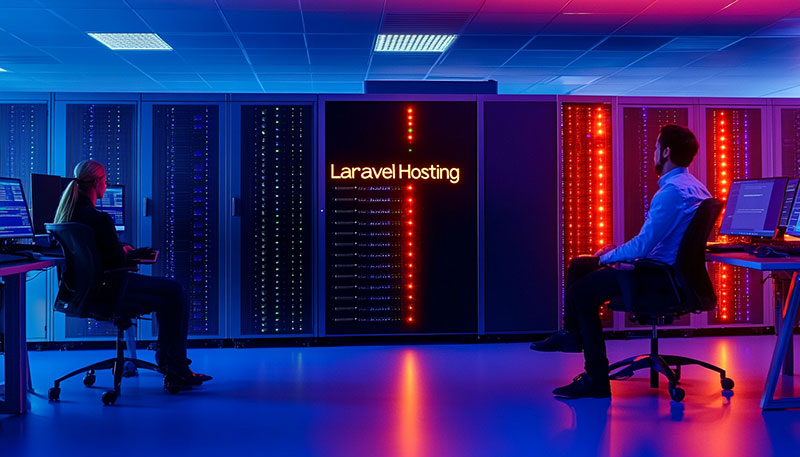


Leave a comment